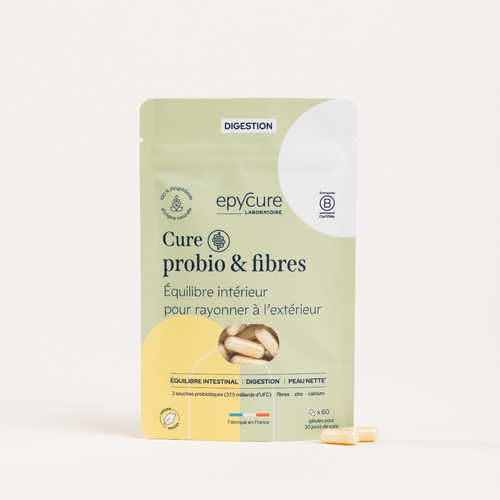In spring, with the flowering and the arrival of pollen , the air becomes loaded with allergenic substances , responsible for all the typical symptoms: sneezing , itchy eyes and nose , runny nose , allergic conjunctivitis , asthma , and many others... Around 25% of the population is susceptible to seasonal allergies , in particular allergic rhinitis associated with pollen, the most common.
The onset of allergy symptoms is triggered by a cascade of compounds . In the body, the immune system is protected against attacks by its immunoglobulins. In the case of an allergy, it is our antibodies - IgE - that are impacted. As soon as an allergen crosses the body's first defense barriers, they multiply in very large quantities in the blood, which triggers the release of histamine, a signaling molecule of the immune system, skin, stomach, and brain. It is this molecule that is responsible for allergic symptoms.
How to treat it?
In the long term or occasionally, several solutions can be put in place to limit the symptoms of seasonal allergies, which can sometimes be disabling.
Among all the remedies that your doctor will certainly prescribe (immunotherapy, eye drops, homeopathy, essential oils, etc.), antihistamines are most often indicated to reduce allergic symptoms , or corticosteroids if these are too severe. In the long term, desensitization can be implemented, which consists of introducing the allergen in small quantities and daily for several years to educate, in a way, the immune system and make it tolerant .
And what about food?
Adapting your diet from autumn to prepare your body for the arrival of allergens is, however, one of the best solutions to pamper your digestive system , this is where 70% of our immune system resides . It is essential to take care of the intestinal wall, the digestive mucous membranes and the microbiota, so that the intestine can properly perform its functions: absorb nutrients , act as a barrier against pathogens and generate beneficial substances . Supporting the liver in the months before the onset of allergies is also very important.
Ultra-processed products , sugar and refined cereals are irritating and pro-inflammatory foods that can damage the integrity of the intestinal wall, saturate the liver and facilitate the accumulation of toxins. It is therefore advisable to reduce them to limit the appearance of allergic signs by promoting the consumption of foods rich in antioxidant and anti-inflammatory nutrients .
Vitamin C
Vitamin C is an antioxidant particularly recognized for its multiple benefits: strengthening the immune system , reducing fatigue , improving cognitive functions , etc. Its activity on allergic disorders has shown that it helps to reduce symptoms, particularly runny noses, sneezing and itching, but especially on strengthening the immune system by reducing the cells responsible for inflammation .
It is found mainly in colorful fruits and vegetables (red pepper, acerola, kiwi, citrus fruits, etc.), and it is recommended to consume it every day: it is the famous “5 fruits and vegetables a day” .
Quercetin
Very present in foods, this compound is one of the most studied flavonoids . It is considered a natural antihistamine thanks to its antioxidant and anti-allergic properties that stimulate the immune system.
They are mainly found in onions, broccoli and apples. It is recommended to consume them at least once a day , whether raw or cooked, to minimize allergic symptoms. Combined with vitamin C, their action on allergies is reinforced .
Vitamin E
It is said to effectively reduce nasal and ocular symptoms while protecting the nasal mucosa and restoring normal hydration. Its anti-inflammatory properties will generally improve allergic symptoms.
You can consume it through vegetable oils and animal products like eggs or milk.
Green tea
Tea is primarily composed of polyphenols, molecules with multiple benefits. Thanks in particular to epigallocatechin, tea acts as a treatment against the first signs of allergies (runny nose, irritation, etc.) by helping to reduce inflammatory cells.
Spirulina
This algae is nature's richest and most complete source of nutrition . Composed of super antioxidants and vitamins, it has many therapeutic functions, including anti-allergy, helping to strengthen the body's natural defenses and increasing its resistance.
Other foods remain interesting for their role on immunity, such as fermented foods , for example, which nourish the intestinal microbiota, or spices (turmeric, ginger, etc.) thanks to their antioxidant and anti-inflammatory power which help to improve digestion and therefore immunity.
Adopt our treatments to boost your immune system!
Natural defenses cure
In capsule form, our Natural Defenses Cure provides you with essential nutrients for strengthened immunity and better body resistance . Thanks to its clinically proven active ingredients, yeast beta-glucans and echinacea, it strengthens the immune system and the body in case of winter discomforts . Simply add it to your morning routine, taking care of your immunity has never been easier.
Probiotic & fiber treatment
Recognized for their digestive benefits, certain probiotic strains also play a role in the immune system. Clinically proven, the strains Lactobacillus plantarum LMG P-21020 and Lactobacillus rhamnosus DSM16605 have been selected among other strains in our Probiotic & Fiber Cure to help you reduce the duration and intensity of respiratory symptoms .
Nose & throat comfort treatment
A fast-acting treatment for occasional symptoms, that's what the Nose & Throat Comfort Treatment promises . Thanks to the synergy of aromatherapy, herbal medicine and propolis, this food supplement helps you cope with respiratory discomfort by strengthening your immune system while soothing the respiratory tract from 4 days .
To learn more and tailor your treatment to your specific case, contact your doctor or healthcare professional for a checkup and to run certain tests. They will provide you with all the additional information you need. Take care!



